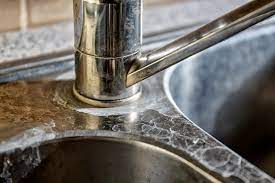When heavy calcium deposits are left behind on your appliances, fixtures, even your hair, learn how to identify the signs of hard water and how to solve it.
Many people throughout the country deal with hard water every day. If you’ve ever felt as though your water doesn’t quite do what you need, chances are good that your home has hard water. The quality of your water has a big impact on every aspect of your life, from showering to washing clothes. It’s good to know how to deal with the mineral deposits that go hand-in-hand with this type of water. If you’re uncertain what kind of water you have, keep reading. We’ll go through the different signs of hard water to help you determine how to move forward!
Evidence of Scaling
Have you noticed an opaque residue around your faucets, drains, and even on your dishes? This residue is a mineral build-up called scaling which is a common result of hard water. It’s often hard to clean off no matter how much you scrub, and it always comes back in no time. That’s because the large amounts of minerals in your water have dried and collected in those areas. It’s not dangerous, but it doesn’t look pleasing.
Soap Residue
Soap doesn’t react in the same way with hard water as it does with softer water. The suds created within hard water don’t bubble up as much because the water is heavier and the minerals keep the soap from creating suds. This is why it’s often harder to wash up when you have hard water. From washing your hands to doing the laundry, this plagues all kinds of different soaps. It often takes several more rinses before the soap residue clears away.
Strange Water Flavor
Do you dislike the taste of your tap water? This is often one of the signs that cause people to suspect their water might have a hard quality. Hard water isn’t dangerous to drink but it does have a different flavor than soft water. If you notice a big difference in flavor between your bottled water and your tap water, that’s a potential sign you have hard water in your home.
Red or Brown Stains
Are there often reddish-brown marks staining your toilet and other drains? It looks a lot like rust and is not pleasant to see on your sparkling white porcelain toilet. This occurs when a specific mineral, iron, is present within your water. Instead of creating the typical opaque white scaling, it collects in reddish-brown stains.
Clogged Pipes
Due to all of the minerals in your water, your pipes are more inclined to clog up over time as the minerals get caught in the system. Think back over the last year and write down how many times you’ve had to deal with clogged pipes. Write down how many times you’ve had to repair water appliances, such as the water heater, dishwasher, or even your tea kettle. If it’s a significant number, chances are good that hard water is the culprit.
Skin Irritation
It’s not strange to have irritated or dry sky during the winter when the weather gets less humid, but you shouldn’t have to deal with this problem all year round. If your family has skin problems, it could be your water that’s the cause. Soap is harder to rinse off with hard water, which leaves soap residue on your skin if you’re not careful. Soap irritates and dries out skin if left on for too long. The minerals in your water also might irritate skin that is already sensitive. If you do have hard water, make sure to take the extra steps to rinse away soap thoroughly.
Ways to Fix Hard Water
Not all is lost! There are several ways to deal with the problems hard water creates.
Lower Temperatures
Sometimes lowering the base temperature of your water heater does a lot of good when it comes to the worst kind of scaling. Hotter water creates a more concentrated collection of minerals. If scaling is a big problem in your home, try turning down the water heater.
Use Vinegar
Having trouble cleaning away the stains and scaling on your drains, faucets, and dishes? Does your washer leave your clothes looking dull and worn out after only a single wash? Add in a little bit of white vinegar to the water to help deal with all of these problems. Instead of fabric softener, use some white vinegar to help your clothes become vibrant again. Instead of rinsing your dishes with regular water, add in some vinegar. Use a vinegar solution on your drains and faucets to clear the scaling away. Vinegar is a low-tech and easy solution for dealing with hard water.
Install Softeners
For a more permanent solution, it’s best to install a water softening system into your home. There are several types, from brine systems to conditioning systems. These sit next to your water tank and add in an agent to the water as it flows into your home. This agent reacts with the minerals and softens the water so that you’ll never have problems again. The nice thing about a professional softener system is that you’re often able to customize the way it works. This way you’re able to soften your hot water but leave your cold drinking water alone, depending on your preferences.
For Best Results Clearing Up Signs of Hard Water, Call in the Professionals
If you’re ever uncertain, make sure to go through the signs of hard water and check off each one. These signs help you determine your water quality so that you’ll be able to start planning on how to fix it. The best way to deal with hard water is to call in your local professionals to take a look. They’ll give you several options on how to permanently soften your hard water without any extra effort on your part. Feel free to contact us at any time and we’ll get your water sparkling in no time!


